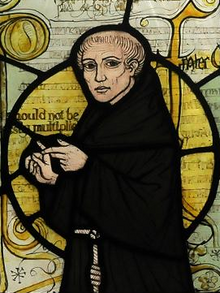Occamism

| Part of a series on |
| Catholic philosophy |
|---|
   |
|
Occamism (or Ockhamism) is the philosophical and theological teaching developed by William of Ockham (1285–1347) and his disciples, which had widespread currency in the 14th century.
Occamism differed from the other Scholastic schools on two major points: (1) that only individuals exist, rather than supra-individual metaphysical universals, essences, or forms (universals are the mind's abstract products and have no independent existence),[1] and (2) the reduction of ontology.
Content and method
Occamism questions the physical and Aristotelian metaphysics and, in particular, insists the only reality accessible to knowledge is intuitive. The universals, which exist only in the mind,[1] have no correspondence with reality and are mere signs that symbolize a multiplicity of individuals. The further one goes from experience and generalizes, the more one imagines the constitution of the universal expressed by names. It is therefore necessary to revise the logical structures of discourse and language to separate the sign from the signified thing. Criticism of the concept of cause and substance, especially by the Occamistic Nicholas of Autrecourt, reduces the sciences to immediate and intuitive ways of knowing.
The Occamists using the
Occamism had wide influence between the 14th and 17th centuries,[3] contributing to the progressive dissolution of Scholastic Aristotelianism.[4]
See also
Notes
- ^α De contemptu mundi (book 1, v. 952) satirical work by Bernard of Cluny, a Benedictine monk of the 12th century who attacked the corruption of the laity and the Church of his time and who mentioned the nominalistic polemic of the 12th century against the reality of universals: a debate that, according to philosophical historiography, Occamism will take up in the 14th century.[5] According to other authors, Occamism does not resume the nominalistic theses but expresses about universals the doctrine of conceptualism.[6]
References
- ISBN 978-0-13-158591-1.
- ^ Garzanti's Encyclopedia of Philosophy, ibid.
- ^ William J. Courtenay, Ockham and Ockhamism: Studies on the Dissemination and Impact of His Thought , 9004168303, 9789004168305, 9789047443575, Brill Academic Pub., 2008.
- ^ Dizionario di filosofia Treccani (2009), ibidem
- ^ In Dictionary of philosophy Treccani (2009)
- ^ In Enciclopedia Garzanti di Filosofia
Further reading
- Brundage, James (2008). "Canon Law in the Law schools". The history of medieval canon law in the classical period. Catholic University of America Press (Wilfried Hartmann & Kenneth Pennington, eds.). p. 115. ISBN 978-0813214917.
- Panaccio, Claude (2004). Ockham on Concepts. Aldershot: Ashgate. ISBN 978-0-7546-3228-3.
- Francesco Bottin, The Science of Occamists. Late medieval science, from the origins of the nominalist paradigm to the scientific revolution, Maggioli 1982.
- William J. Courtenay, Ockham and Ockhamism. Studies in the Dissemination and Impact of His Thought, Leiden, Brill 2008.
- Christian Rode, A Companion to Responses to Ockham, Leiden, Brill 2016.



